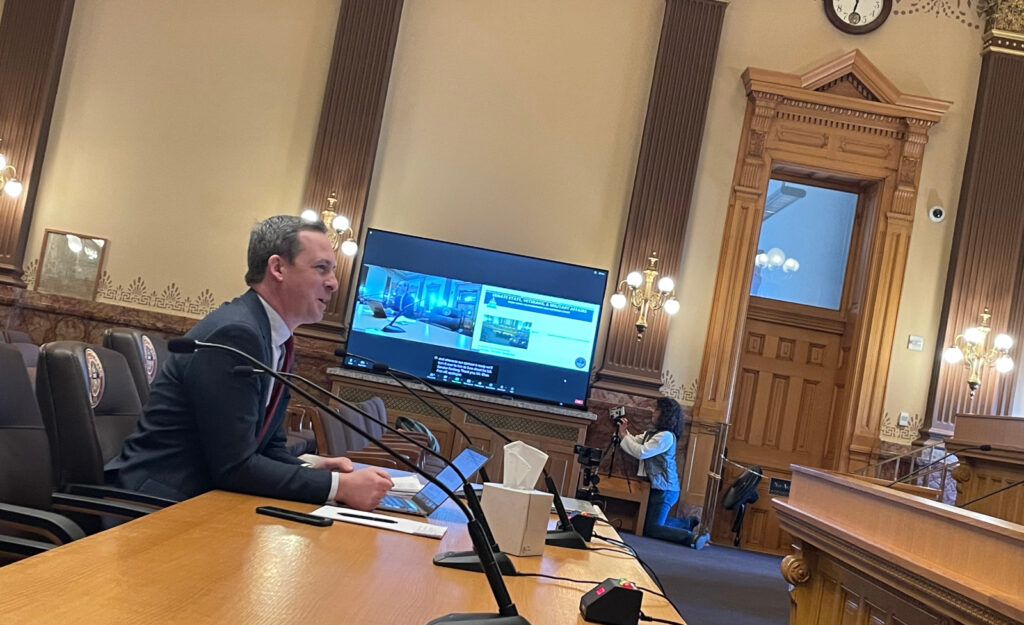By Jeffrey A. Roberts
CFOIC Executive Director
The title is set for a proposed Colorado initiative to repeal newly enacted legislation that narrows the definition of “public business” in the Colorado Open Meetings Law as it applies to the General Assembly and lets lawmakers communicate by email and text message without it being a “meeting” under the statute.
But the measure is still a long way from making it onto the November statewide ballot. Even if proponent Jon Caldara decides the language approved Wednesday by the Ballot Title Setting Board is easy enough for voters to understand, it could cost as much as $1 million to collect the necessary petition signatures.
“The wording could be much worse,” Caldara, president of the libertarian Independence Institute think tank, told the Colorado Freedom of Information Coalition.

The ballot title for proposed Initiative #287 says: “Shall there be a change to the Colorado Revised Statutes repealing recently created exemptions to the Colorado Open Meetings Law on what communications between state legislators constitute a meeting and must be open to the public?”
The initiative would delete most of the changes made by Senate Bill 24-157, which Gov. Jared Polis signed into law last month.
Gone would be new statutory language that: 1) exempts “any form of written communication, electronic or otherwise, exchanged by two or more members of the General Assembly” from the open meetings law; 2) requires public notice of legislative meetings only if a quorum is “contemporaneous,” allowing for smaller-group meetings on the same topic and discussions by phone, email and text message that the public may never know about; and 3) redefines “public business” as it applies to the General Assembly to mean only introduced legislation, resolutions and other matters before a committee or draft legislation discussed by a quorum of a committee during a legislative session or by a quorum of an interim committee.
The initiative would leave only SB 24-157’s requirement that legislative leaders, over the next three years, discuss the open meetings law as it applies to the General Assembly during meetings of their executive committee and take public comment.
CFOIC opposed the bill, testifying in committee hearings that it will encourage state lawmakers to formulate and debate public business in an unlimited way via email, text message and ephemeral messaging apps such as Signal without the public’s knowledge and scrutiny. If such electronic communications haven’t already been deleted, we stressed, they likely would not be available to request because the Colorado Open Records Act excludes “[a]ll documents prepared or assembled by a member of the general assembly relating to the drafting of bills or amendments” from the definition of “public records.” Those are considered “work product.”
Senate President Steve Fenberg, a Boulder Democrat and prime sponsor of SB 24-157, said in committee the bill was meant to “create clarity, to codify what is essentially current guidance that we already operate under and to remove gray areas so that everyone has a shared understanding of how to follow the law.” But CFOIC argued that it undermines the declaration in the open meetings law, initiated by Colorado voters in 1972, that “the formation of public policy is public business and may not be conducted in secret.”
Caldara, whose organization is a CFOIC member, said SB 24-157 “was one of the most arrogant, pompous, full-of-hubris maneuvers I’ve ever seen. I cannot believe people are not there (at the Capitol) with pitchforks.”
Initiative #287, he thinks, would be a “slam dunk” to pass “if voters understood what it is.”
“Our last transparency initiative, which was to open up school board negotiations with unions passed by 70 to 30,” Caldara noted. “That was a slam dunk. The money we had to spend was getting it on the ballot, not advertising it.”
“The issue I have is, I’m not too sure where to go to get the funding to put something on the ballot,” he added. “It has become much more expensive than it ever has been. We’ve been able to get things on for as low as $400,000, and now it’s close to $1 million to get to get something on the ballot.”
Follow the Colorado Freedom of Information Coalition on X (formerly Twitter) @CoFOIC. Like CFOIC’s Facebook page. Do you appreciate the information and resources provided by CFOIC? Please consider making a tax-deductible donation.




